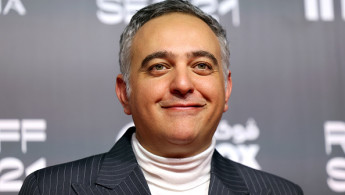Lawyer accuses Egyptian co-producer of controversial Netflix movie of 'violating social principles'
Cairo - An Egyptian lawyer has filed a complaint this week before the prosecutor general against a prominent producer, accusing him of “violating social principles” for co-producing a controversial rom-com Arabic adaptation of the popular film 'Perfect Strangers.'
The film, entitled ‘Ashab Wala Aaz’, the first Arab film produced by Netflix, has been stirring up a heated debate in Egypt and the Arab world since it was launched on 20 January on the streaming platform. Critics argue that it “promotes homosexuality” and “portrays taboos”. The movie is rated 16+.
Lawyer Ayman Mahfouz filed a complaint before the prosecutor general against Egyptian producer Mohamed Hefzy, also the head of the Cairo International Film Festival, accusing him of “attempting to change the social status of the country and promote... thoughts that violate the values and principles of society via a suspicious entity [Netflix]”.
“Hefzy produced a number of controversial films over the past years other than ‘Ashab Wala Aaz,’ including ‘Reesh’ (Feathers) and ‘Eshtebak’ (Clash) that violate social principles. That’s why I’m taking legal action against him,” Mahfouz told The New Arab.
In the movie, Egyptian actress Mona Zaki appears in a contentious scene taking off her underwear without her body being revealed, putting it in her handbag. The scene has sent shock waves across Egypt.
In another, while she and her friends are opening up to each other, she confronts her husband that has not been intimate with her for a whole year.
The film also involves a Lebanese father agreeing to his teenage daughter having sex with her boyfriend, while criticising his wife’s rejection as regressive.
Another character in the film, who turns out to be gay to the surprise of his friends, is accepted by them against all odds.
Mahfouz said that he had based his action against Hefzy on article number 174 of Egypt’s penal code, which partially dictates that a person who seeks to change the social codes can be sentenced to up to five years in prison.
Meanwhile, Mahfouz has sent, also this week, a legal notice to Egyptian Minister of Culture Enas Abdel-Dayem and the affiliated censorship authority, warning them that “in case ‘Ashab Wala Aaz’ is screened publicly, [he] will file a lawsuit before the administrative court against the minister in her capacity.”
Neither Hefzy nor Abdel-Dayem could be reached for comment.
Others have voiced their indignation at the movie's content. In a phone interview with Egyptian ETC satellite TV channel, al-Azhar Islamic scholar Elham Mohamed Shahin urged people who object to the movie to file complaints before the prosecutor general and call on him to ban the film in order to end “the spread of obscenity”.
Lawyer and women’s rights advocate Nehad Aboul-Komsan begs to differ though.
“The film did not include any obscene scenes whatsoever,” she argued in a TV interview with Egyptian Al-Kahera Wal Nas satellite channel.
Aboul-Komsan added that the rebellious sentence Mona Zaki uttered in the movie about the lack of intimacy between her and her husband rang a bell among Arab and Egyptian households, as many “consider a wife as part of the décor in the family.”
“The film unveils problems already existing in society,” she added.
‘Ashab Wala Aaz’ is an Arabic adaptation of the Italian film ‘Perfetti Sconosciuti’, one of many other versions of the same movie in different languages.
In 2018, a French version entitled ‘Nothing to Hide’ was also produced by Netflix.
One year later, the film was listed in Guinness records as the most remade movie in the history of cinema.





 Follow the Middle East's top stories in English at The New Arab on Google News
Follow the Middle East's top stories in English at The New Arab on Google News


